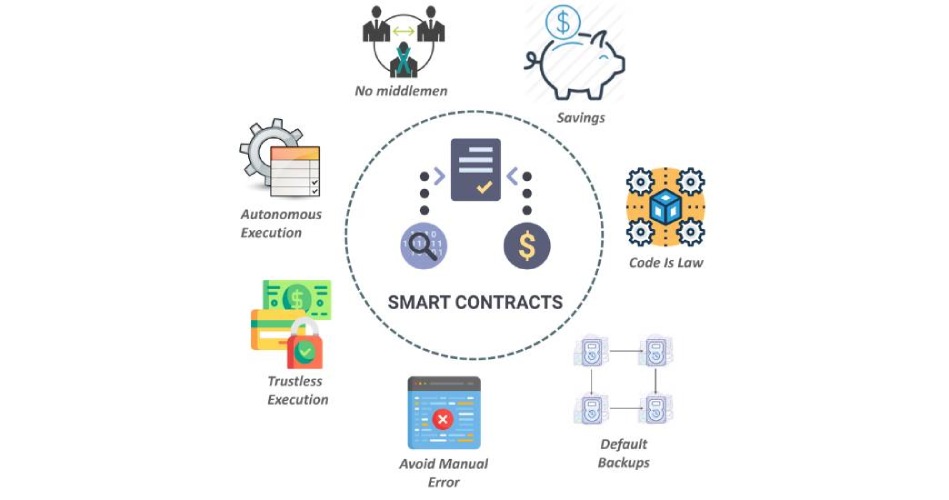-
In this post, discover the technical intricacies and applications of smart contract development with Ethereum. With smart contract solutions, Ethereum blockchain development architecture introduces the concept of business automation and influenced the entire blockchain future.
What are Smart Contracts
Smart contracts are developed as a viable blockchain platform for two or more parties to perform transactions. To do so, they manipulate the characteristics of blockchain potential. Developers build a smart blockchain contract to operate as a code protocol able to verify, execute, and promote a contract without any intermediaries automatically, efficiently, and effectively. In a conflict-free, transparent and democratic way, smart contract implementations can be used to trade ownership in the form of stock, real estate, or properties. Since there is no middle man, because of the use of the immutability and encryption features of blockchain, the method is also secure and tamper-proof.
Factors Behind Increasing Adoption
In this part, discover why smart contracts are important for business excellence.
 Source Edureka
Source EdurekaEstablishment of Trust
Smart contracts instill trust in the entire system or arrangement for the making of transactions created by the parties. No entity can change business contracts with smart contact solutions. They cannot change the terms or conditions of a contract without consensus Therefore, the documents remain safe and preserved with proper encryption methods, without the need for a centralized authority. The use of smart contracts also gives the parties trust, without fully having to know the other side.
Cost-Effective Improvements
The use of smart contracts also contributes to advantages for the parties involved in the trade. It makes savings by removing unnecessary company agents, notaries, assistance, or some other form of intermediary. In plain terms, the smart contract eliminates the extra fees associated with other services out there.
Enabling Autonomy
In order to allow the transaction or the contract, the use of a smart contract brings control, without requiring any third-party intermediary.
Security Strengthening
Smart contracts are secure in contrast to other forms of conventional methods of contract management. If correctly implemented, smart contracts can be difficult to hack. After all, to do nothing that can be manipulated or changed, they use cryptography. Also, Read | Driving Business Performance with Blockchain Smart Contracts
Smart Contracts Development with Ethereum
The initial implementation of intelligent contracts coincided with the release in 2009 of bitcoin, the blockchain. However, in Ethereum, where Vitalik Buterin concentrated on the proper implementation of smart contracts, the true usage was first made. He assumes that a smart contract is a program that uses code to decide the asset owner and automates the mechanism for doing so. If the assets are not allocated to an individual, the refunds will be rendered under the conditions laid down in the Smart Contract. The scripting language and the idea of setting up smart contracts were presented by Ethereum to do more than simply pass values or assets between peers. It allowed designers to create their programs through smart contracts, which are also known as autonomous agents, according to the Ethereum white paper.
Ethereum Smart Contracts
The Ethereum blockchain boasts one of the world's leading smart contract systems and is the preferred option for most developers. It has developed by leaps and bounds since the platform's launch in July 2015. It now promotes the creation of smart contract solutions for virtually everything from online gaming to loyalty programs. In reality, Ethereum smart contracts offer an extended degree of standardization and support. For developers to obey, the platform has clearly specified guidelines. For developers, it makes smart contract creation simpler and less risky. Ethereum aims, on the support side, to strengthen the way we build and execute smart contracts. For that, they released their programming language for smart contracts, Solidity. It not only helps with standardization but also makes it simpler for business use cases to adopt and set up smart contracts. It is a Turing-complete. Thus, it is easier with Ethereum to facilitate a variety of algorithmic commands. Ethereum smart contracts provide multi-signature functionality. It means that when the transactions can execute out based on the agreement of the individuals within a group using smart contracts.
dApp (Decentralized Applications) Development
It is necessary that dApps on top of blockchain should communicate with each other seamlessly in order to build a healthy ecosystem. What would happen, however, if we have two tokens, say Token Alpha and Token Beta, and both have distinct structures of smart contracts? The developers would need to carefully research all these contracts in order for it to happen and figure out exactly how these tokens will communicate with each other. Now, this really doesn't bode well now for scalability, does it? If there are 100 different tokens with 100 different contracts, it would take a large number of complicated calculations to narrow down on all the credentials and requirements needed to ensure that transfers will go through between all these tokens. Also, Read | dApp (Decentralized App) Development | Increasing Importance
ERC-20 TOKEN SMART CONTRACT
One of Ethereum's most notable standards for smart contract specifications is the ERC-20 token contract. It has emerged as the technological standard for fungible token implementations for all smart contracts on the Ethereum blockchain. ERC-20 describes a standard set of rules that should be adhered to by all fungible Ethereum tokens. Consequently, this token standard empowers developers to reliably predict how new tokens in the Ethereum framework would operate. It simplifies and encourages the activities of developers. They can continue their work, knowing that they do not need to redo each and every new project for the launch of a new token every time, as long as the token follows the rules.
Use Cases
Smart contracts development finds use cases across a variety of business solutions, including insurance, crowdfunding, IoT, real estate, finance, foreign trade, and more. They can come in use as a replacement for notaries, judges, and legal advisors.
Substituting Escrow Services
In areas where you have escrow services and middlemen, smart contracts may be used. Smart contracts, however, need to be highly agile and proficient in this situation. Both situations and circumstances need to be thoroughly prepared for them. One example of this is the development of a smart contract job portal such as Upwork. A portal where smart contracts serve as an escrow rather. It eliminates a centralized network that asks for commissions for any good job they do. Our smart contract development team ensures the development of stable and successful smart contracts with ethereum and other blockchains for various purposes, including crowdfunding, bidding, authorization, and dApps.

Our Offices
INDIA
Emaar Digital Greens, Sector 61,
Gurugram, Haryana
122011.
Welldone Tech Park,
Sector 48, Sohna road,
Gurugram, Haryana
122018.














